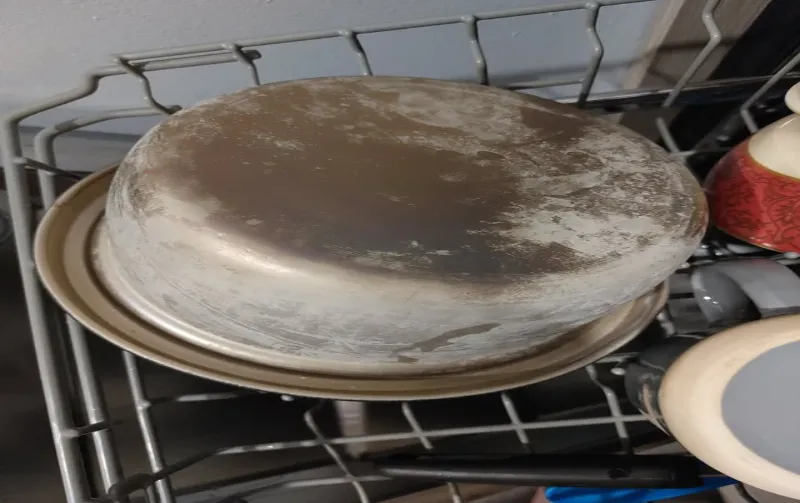Some rice cooker parts can be dishwasher-safe, but always check the manufacturer’s instructions. Generally, the inner pot and accessories may be placed in the dishwasher, but the main body and electrical components should not.
Rice cookers have become a staple in kitchens for their convenience and foolproof cooking methods for perfect rice every time.
Ensuring proper care and cleaning of your rice cooker is crucial for its longevity and performance.
Before attempting to clean, always disconnect the appliance to avoid electrical hazards.
Taking care to clean your rice cooker correctly not only maintains hygiene but also preserves the taste and quality of the rice cooked within it.
Be mindful that dishwashing protocols vary across different brands and models, so consulting the user manual before proceeding with cleaning is your safest bet for maintaining your appliance in top working order.

The Truth About Dishwashing Rice Cooker
Dishwasher safety for rice cookers is shrouded in myths and assumptions.
Many users assume that all kitchen appliances are dishwasher-friendly, but this is a common misconception.
It’s imperative to know that various types of rice cookers have different dishwasher safety profiles.
For example, while a stainless steel rice cooker might withstand the rigors of a dishwasher, a cooker with a non-stick inner pot might be damaged.
Crucially, it is essential to refer to the manufacturer’s guidelines.
These guidelines provide the most accurate information on whether specific components of the rice cooker, such as the pot, lid, or even the whole appliance, can be put in a dishwasher.
Manufacturers might have designed some parts to be detachable and dishwasher safe, whereas others require manual cleaning.
| Rice Cooker Type | Dishwasher Safe? |
|---|---|
| Standard Electric | Some parts may be, refer to the manual |
| Microwave Rice Cooker | Mostly safe, verify materials |
| Multifunction Rice Cooker | Some parts may be, refer to manual |
Proper Maintenance And Cleaning Tips
Cleaning a rice cooker properly ensures both safety and durability. Start by removing the cooker from its power source and allowing it to cool down.
Disassemble the parts, usually consisting of the inner pot, lid, steam vent, and any additional spoons or cups.
Inspect each component to determine if it’s dishwasher safe. Generally, the inner pot and accessories can be placed on the top rack of the dishwasher for cleaning.
The main body of the cooker, however, should never be immersed in water. Instead, wipe the exterior with a damp cloth.
Focus on the heating plate using a soft sponge to remove any food remnants, ensuring it’s always dry before use.
Adhering to the manufacturer’s instructions prevents damage during the cleaning process.
To prevent mishaps, avoid using abrasive cleaners or scouring pads which could scratch surfaces.
Also, make sure not to expose electrical components to water.
Regular maintenance, such as checking the power cord for fraying and the inner pot for scratching, markedly extends the life of your rice cooker.
Finally, after cleaning and drying, reassemble all parts attentively for the next use.
| Component | Dishwasher Safe? |
|---|---|
| Inner Pot | Yes |
| Accessories (spoon, measuring cup) | Yes |
| Lid | Check Manufacturer’s Guide |
| Main Body | No |
Alternative Cleaning Methods For Rice Cookers
Rice cookers often require careful cleaning to maintain their optimal performance.
For those seeking alternative methods to dishwasher use, mixing vinegar with water offers a simple yet effective hack.
Fill the cooker with equal parts of both liquids, let it soak briefly, and then scrub to remove stubborn build-up. This method also helps in getting rid of lingering odors.
The handwashing technique comes highly recommended for a deep clean, ensuring no leftover residue.
Using warm, soapy water and a soft sponge, scrub the interior and exterior surfaces gently.
Rinse thoroughly with clean water to exterminate any soap traces, which could affect the taste of your rice.
| Cleaning Method | Effectiveness |
|---|---|
| Vinegar and Water | High |
| Handwashing with Soap | Very High |
| Dishwasher (If applicable) | Varies |
The table above compares the cleaning methods for rice cookers, with handwashing taking the lead in effectiveness.
Although the dishwasher method may vary depending on the appliance’s material and manufacturer instructions, vinegar, and handwashing remain reliable for those seeking alternative cleaning solutions.
Frequently Asked Questions For Can Rice Cooker Go In Dishwasher
Can Dishwashers Safely Clean Rice Cookers?
Dishwashers can clean rice cooker pots if they are labeled dishwasher-safe.
How To Determine Rice Cooker Dishwasher Safety?
Check the manufacturer’s instructions or label on the rice cooker pot to confirm if it is dishwasher-safe before cleaning.
What Parts Of Rice Cooker Are Dishwasher-safe?
Typically, only the removable inner pot and accessories of a rice cooker are safe for dishwasher cleaning, not the electrical base or lid.
Tips For Dishwashing Rice Cooker Accessories?
Ensure that rice cooker accessories are dishwasher-safe, then place them on the top rack, avoiding overcrowding for the best cleaning results.
Conclusion
To sum up, verifying your rice cooker’s compatibility with a dishwasher is crucial for safe cleaning. Always consult the manual for specific instructions.
Embracing this simple check can prolong your appliance’s lifespan while keeping kitchen routines efficient.
Remember, not all cookers are dishwasher-safe—when in doubt, opt for handwashing.
